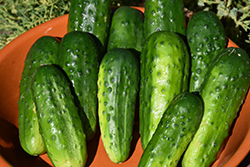Height: 14 inches
Spacing: 12 inches
Sunlight:
![]()
Hardiness Zone: (annual)
Description:
A high yielding and uniform variety with excellent disease resistance; produces 3"-6" long, dark green cucumbers with black spines; crunchy, delicious interiors are perfect for pickling, relish or fresh eating; best when trellised and harvested daily
Edible Qualities
Pioneer Cucumber is an annual vegetable plant that is typically grown for its edible qualities. It produces small dark green long cucumbers (which are technically 'berries') with black spines and light green flesh which can be harvested at any point. The cucumbers have a delicious taste and a crunchy texture.
The cucumbers are most often used in the following ways:
- Fresh Eating
- Eating When Cooked/Prepared
- Pickling
Planting & Growing
Pioneer Cucumber will grow to be about 14 inches tall at maturity, with a spread of 6 feet. When planted in rows, individual plants should be spaced approximately 12 inches apart. This fast-growing vegetable plant is an annual, which means that it will grow for one season in your garden and then die after producing a crop.
This plant is typically grown in a designated vegetable garden. It should only be grown in full sunlight. It does best in average to evenly moist conditions, but will not tolerate standing water. This plant is a heavy feeder that requires frequent fertilizing throughout the growing season to perform at its best. It is not particular as to soil pH, but grows best in rich soils. It is quite intolerant of urban pollution, therefore inner city or urban streetside plantings are best avoided. Consider applying a thick mulch around the root zone over the growing season to conserve soil moisture. This is a selected variety of a species not originally from North America.
Pioneer Cucumber is a good choice for the vegetable garden, but it is also well-suited for use in outdoor pots and containers. It is often used as a 'filler' in the 'spiller-thriller-filler' container combination, providing the canvas against which the larger thriller plants stand out. Note that when growing plants in outdoor containers and baskets, they may require more frequent waterings than they would in the yard or garden.
